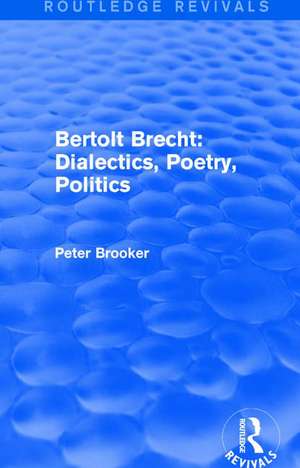Routledge Revivals: Bertolt Brecht: Dialectics, Poetry, Politics (1988)
Autor Peter Brookeren Limba Engleză Paperback – 11 iul 2018
| Toate formatele și edițiile | Preț | Express |
|---|---|---|
| Paperback (1) | 143.83 lei 43-57 zile | |
| Taylor & Francis – 11 iul 2018 | 143.83 lei 43-57 zile | |
| Hardback (1) | 515.82 lei 43-57 zile | |
| Taylor & Francis – 11 ian 2017 | 515.82 lei 43-57 zile |
Preț: 143.83 lei
Preț vechi: 246.68 lei
-42% Nou
Puncte Express: 216
Preț estimativ în valută:
27.52€ • 28.56$ • 23.01£
27.52€ • 28.56$ • 23.01£
Carte tipărită la comandă
Livrare economică 17-31 martie
Preluare comenzi: 021 569.72.76
Specificații
ISBN-13: 9781138245143
ISBN-10: 1138245143
Pagini: 284
Dimensiuni: 138 x 216 x 30 mm
Greutate: 0.53 kg
Ediția:1
Editura: Taylor & Francis
Colecția Routledge
Locul publicării:Oxford, United Kingdom
ISBN-10: 1138245143
Pagini: 284
Dimensiuni: 138 x 216 x 30 mm
Greutate: 0.53 kg
Ediția:1
Editura: Taylor & Francis
Colecția Routledge
Locul publicării:Oxford, United Kingdom
Public țintă
Postgraduate and ProfessionalCuprins
Acknowledgments; Abbreviations; Introduction. Why Should Brecht’s Name Be Mentioned?; Part I: Dialectics and Drama; 1. Dialectics in the Theatre 2. Dialectical Drama and a Changing World 3. A ‘By No Means Undialectical’ Epic Theatre: Brecht’s Gestus 4. ‘Only’ "Actually" is it Familiar’: Brecht’s Verfremdungseffekt; Part II: In and Above the Stream; 5. ‘Bad Time for Poetry’ 6. Alienating Verse 7. ‘The Art… Of Not Submitting; Part III: Marxist Art and Critical Attitudes; 8. ‘A Conceivable Aesthetic’ 9. A Choice of Critics 10. Lenin and/or Stalin: ‘The Measures Mistaken’; Part IV: The Marxist Artist in Socialist Berlin; 11. He Who Says Yes and No 12. ‘The Travails of the Plains’ 13. Communist Ways and Days of the Commune; Bibliography; Index
Descriere
First published in 1988, this books argues with received accounts to reclaim Brecht’s emphasis on his self-described ‘dialectical theatre’, re-examining firstly the concepts of Gestus and Verfremdung and their realisation in Brecht’s poetry in terms of his attempt to consciously apply the methods of dialectical materialism to art and cultural practice. The author also takes issue with the customary view of Brecht’s career and politics which sees him as compromising either with Communist party dogma or bourgeois aesthetics, to find developing parallels between Brecht’s political and artistic though and the critical dialectics of Marx, Lenin and Mao
